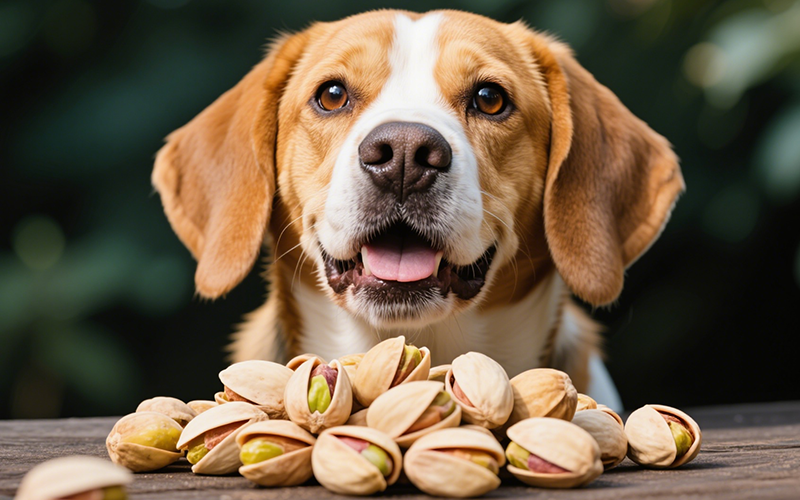Can Dogs Eat Pistachios? Here’s What You Need to Know
- 8 Apr 2025 15:33
Pistachios are a delicious and crunchy snack for humans, but when it comes to dogs, the answer isn’t so simple. While pistachios aren’t inherently toxic to dogs, they do come with several risks that could affect your pup's health. Let’s dive into whether pistachios are safe for dogs and what you need to watch out for.

Can Dogs Eat Pistachios? 🤔
Technically, dogs can eat pistachios, but it’s not recommended. While the nut itself isn't toxic, pistachios come with potential risks that could cause health issues for your dog. The main concerns revolve around the high fat content, choking hazards, and the potential for stomach upset.
The Risks of Pistachios for Dogs 🚨
High Fat Content 🧈
Pistachios are high in fat, and while fat is an essential nutrient for dogs, too much can lead to weight gain, obesity, and pancreatitis (inflammation of the pancreas). Pancreatitis can cause severe stomach pain, vomiting, and diarrhea in dogs. So, while a few pistachios here and there might be fine for some dogs, too many could result in serious health problems.Choking Hazard ⚠️
Pistachios come in their shells, and these shells pose a choking hazard for dogs, especially small breeds or those who tend to eat quickly. Dogs may accidentally inhale or swallow the shells, which can block their airways or cause injury to their digestive tract. Always remove the shells before giving pistachios to your dog, but even then, be cautious.Salt and Seasonings 🧂
Many pistachios are heavily salted or flavored with other seasonings like garlic or onion powder—both of which are toxic to dogs. High salt content can lead to dehydration, vomiting, and in severe cases, sodium poisoning. If you're giving your dog pistachios, ensure they are unsalted and plain.Possible Allergies 🌰
Although rare, some dogs may have allergies to nuts, including pistachios. Symptoms of an allergy may include:Itchy skin 🐾
Swelling 😳
Gastrointestinal upset 💩 If your dog shows signs of an allergic reaction after eating pistachios, you should stop giving them this snack and consult your vet.
Digestive Upset 💥
Nuts, in general, are not the easiest food for dogs to digest. A large amount of pistachios may cause gas, bloating, or diarrhea, especially if your dog isn't used to eating high-fat foods.
What Happens If Your Dog Eats Pistachios? 🚨
If your dog eats a small amount of unsalted pistachios, they may experience mild symptoms like digestive upset or gas. However, if they consume a large quantity or pistachios with salt or seasoning, they might experience more serious issues, including:
Vomiting 🤢
Diarrhea 💩
Dehydration 💧
Abdominal pain 😖
Pancreatitis (inflammation of the pancreas) ⚠️
If your dog shows any of these signs after eating pistachios, it’s best to contact your vet for advice. For serious cases, like difficulty breathing or severe abdominal pain, seek emergency veterinary care immediately.
How to Safely Treat Your Dog 🦴
If you want to treat your dog to something crunchy, consider these safer alternatives to pistachios:
Carrot Sticks 🥕
Carrots are a low-calorie, crunchy snack that’s great for your dog’s teeth and digestive health.Apple Slices 🍏
Apples (without the seeds) are a sweet, healthy treat that’s full of fiber and vitamin C.Green Beans 🟩
Low in calories and high in fiber, green beans are an excellent choice for dogs on a diet.Blueberries 🫐
Blueberries are full of antioxidants and are a great healthy snack for dogs.Sweet Potato 🍠
Sweet potatoes are packed with nutrients and fiber, making them a nutritious and safe treat for your dog.
How PettureX Can Help 🧠
If you’re ever unsure about whether a particular food is safe for your dog, PettureX offers a 24/7 consultation service. PettureX can help you identify safe and healthy foods for your dog and provide advice on portion sizes.
Conclusion: Can Dogs Eat Pistachios? ❌
While pistachios are not toxic to dogs, they are not recommended due to their high fat content, choking hazards, and potential for digestive upset. If you do decide to give your dog a pistachio, ensure it is unsalted, shelled, and offered in moderation. However, it’s safer to choose other healthier snacks like carrots, green beans, or sweet potatoes that are more suitable for dogs.
For any concerns about what foods are safe for your dog, or if you're unsure about portion sizes, PettureX is always available for a 24/7 consultation to help you make the best choices for your dog’s health.
Need help with your dog’s health or diet? Try PettureX for 24/7 consultations and expert care! 🐶💚
Related

Can Dogs Eat Peaches? Vet Explains Benefits, Cyanide Risks & Safe Serving
- 16 Apr 2025
Can Dogs Eat Mulberries? Vet Explains Safety, Benefits & Potential Risks
- 16 Apr 2025
Can Dogs Eat Mozzarella? Vet Explains the Cheesy Truth (Risks & Benefits)
- 16 Apr 2025
Can Dogs Eat Maple Syrup? The Sugary Truth & Why Vets Advise Against It
- 16 Apr 2025
Can Dogs Eat Mango Skin? Vet Explains Why It's a Risky Chew!
- 16 Apr 2025
Can Dogs Eat Mac n Cheese? Vet Explains Why This Comfort Food Is Unsafe!
- 16 Apr 2025
Can Dogs Eat Liver? Vet Guide to This Nutrient-Dense Organ Meat (Benefits & Risks!)
- 16 Apr 2025
Can Dogs Eat Lamb? Vet Insights on This Nutritious Meat Option
- 16 Apr 2025
Can Dogs Eat Licorice? The Sweet Danger & Glycyrrhizin Risk Explained by Vets
- 16 Apr 2025
Can Dogs Eat Jelly? The Sweet Truth About Sugar, Xylitol & Why Vets Say No!
- 16 Apr 2025
